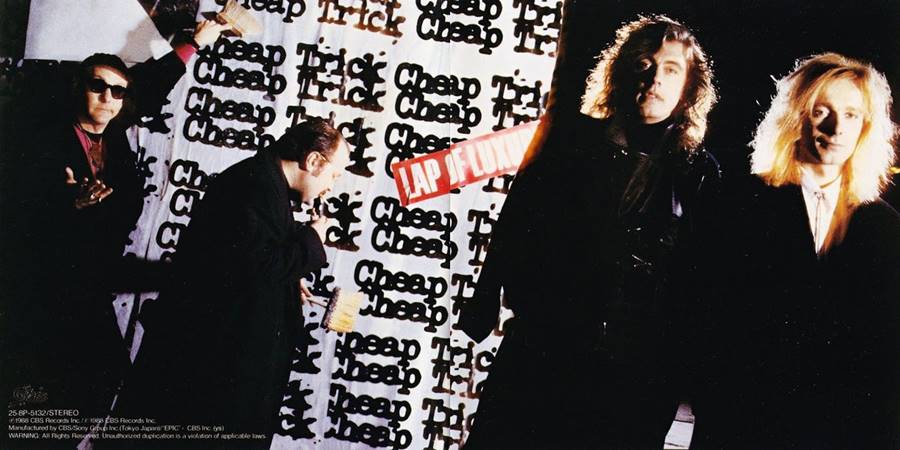
By Jae-Ha Kim
Chicago Sun-Times
November 20, 1990
Back in 1979, Cheap Trick didn’t have to beg anyone to want them. The power-pop quartet from Rockford was riding high on the phenomenal success of their fourth album, “Live at Budokan.”
The hit album, recorded in Japan during a concert tour, spawned several Top 10 singles, including “I Want You To Want Me.” The buzz surrounding “Budokan” also taught the group that timing can be more important than substance. The studio version of the “Want You” song from 1977’s “In Color” album went nowhere fast.
Now Cheap Trick is on another concert tour. The band will open for Heart at 7:30 tonight at the Rosemont Horizon, 6920 N. Mannheim. Only upper-balcony tickets, priced at $20, are available through Ticketmaster outlets (559-1212).
During their scheduled 70-minute set, the Tricksters will perform older hits and new songs from their 13th album, “Busted.”
After spending most of the 1980s in rock ‘n’ roll anonymity, Cheap Trick achieved platinum status two years ago with “Lap of Luxury,” an album that sold more than a million copies. Their syrupy single, “The Flame,” went to No. 1 on Billboard’s pop singles chart. And a new audience awakened to Cheap Trick’s sweeter songs, most of which were composed by writers from outside the band.
“Would we want to do another album like that, where other people write our songs?” said guitarist Rick Nielsen, pondering the pointed question. “Not really. Some of the stuff on the album really weren’t even Cheap Trick-style songs. But on the other hand, we got a lot of people – who ordinarily wouldn’t have listened to us at all – to listen to us. So, for whatever reasons we did what we did, they worked to our benefit.”
The members of Cheap Trick haven’t changed much in 15 years. Nielsen and drummer Bun E. Carlos are the group’s nerdy-looking duo. Vocalist Robin Zander and bassist Tom Petersson are the two heartthrobs. All four are original members. Petersson quit the band in 1980 and rejoined seven years later.
“When we got popular in the late ’70s, people thought we went around trying to promote a contrived image of the cute guys vs. the dorks,” said Nielsen, phoning from Louisville, Ky. “I think it’s pretty obvious to everyone now that we are who we are.
“In high school, I was always the wacky guy. They called me the Screaming Chicken because I was so strange. But I never wanted to look like every other guy in school, either.”
“Cheap Trick,” the group’s 1977 debut album, didn’t turn the band into commercial hitmakers. But for pop and rock music fans, Cheap Trick’s songs were a rare treat. The group’s angry-sounding guitars and 12-string bass served as a striking contrast for Zander’s angst-filled voice on such songs as “He’s a Whore” and “The Ballad of Richard Speck.”
But it was “Budokan,” recorded live at Tokyo’s Budokan concert hall, that won the musicians critical acclaim and a slew of fans worldwide.
“Dream Police” fared respectably the following year, but subsequent albums failed to approach “Budokan” in sales or pop-culture impact.
“We’ve gotten plenty of bad reviews in our time,” Nielsen said. “But a lot of times, it’s just great to get a review. Sometimes the negative reviews are funny in a bad way. But we’ve never been a band that was that concerned about things like that – or image. If we were, we would’ve caved in to what people said we should look like or sound like. But I think that even our most negative detractors would have to agree that we stick true to our instincts.”
When a reporter pointed out that the “stick true” comment seemed to contradict what he said earlier about “Lap of Luxury,” Nielsen defended the group’s reasoning.
“At that time, we agreed that something had to be done,” Nielsen said. “We weren’t sure what that was until we did it. But you know, it’s not like that was the only time we sang other people’s songs. `Ain’t That a Shame’ (from `Live at Budokan’) was a big hit for us, and it was a cover of Fats Domino’s song. And `California Man’ (from `In Color’) was an old Move song.”
Reflecting on his comments, Nielsen added, “You know, I hope I write songs better than I do interviews, because when I read interviews I did with reporters, it seems to be different things than what I actually said. I think I generally don’t come across very well in stories. I end up sounding arrogant, because my quotes are either taken out of context, or they neglect to print that I was joking.”
Chuckling to himself, Nielsen said, “That’s a real cheap trick.”